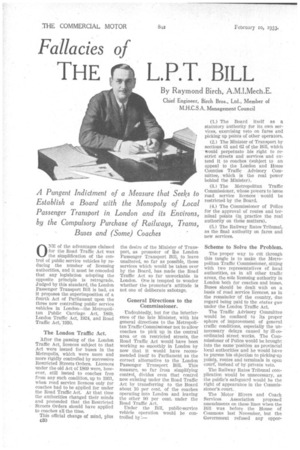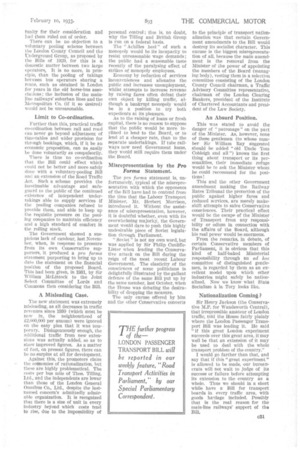Fallacies of
Page 80

Page 81

If you've noticed an error in this article please click here to report it so we can fix it.
THE r L.P.T. BILL
By Raymond Birch, A.M.I.Mech.E.
Chief Engineer, Birch Bros., Ltd., Member of M.H.C.S A. Management Council 0 NE of the advantages claimed for the Road Traffic Act was the simplification of the control of public service vehicles by reducing the number of licensing authorities, and it must be conceded that any legislation adopting the opposite principle is retrograde. Judged by this standard, the London Passenger Transport Bill is bad, as it proposes the superimposition of a fourth Act of Parliament upon the three now controlling public service vehicles in• London—the Metropolitan Public Carriage Act, 1869, London Traffic Act, 1924, and Road Traffic Act,1930.
The London Traffic Act.
After the passing of the London Traffic Act, licences subject to that Act were issued for buses in the Metropolis, which were more and more rigidly controlled by successive Restricted Streets Orders. Licences under the old Act of 1869 were, however, still issued to coaches free from any such condition, up to 1931, when road service licences only for coaches had to be applied for under the Road Traffic Act. At that time the authorities changed their minds and pretended that the Restricted Streets Orders should have applied to coaches all the time.
This official change of mind, plus CS0 the desire of the Minister of Transport, as promoter of Ihe London Passenger Transport Bill, to leave unaltered, so far as possible, those services which would be taken over by the Board, has made the Road Traffic Act so far unworkable in London. One is tempted to wonder whether the promoter's attitude is not one of deliberate sabotage
General Directions to the Commissioner.
Undoubtedly, but for the interference of the late Minister, with his general directions to the Metropolitan Traffic Commissioner not to allow coaches to pick up in the central area or on restricted streets, the Road Traffic Act would have been working so smoothly in London by now that it would have recommended itself to Parliament as the correct alternative to the London Passenger Transport Bill. This measure, so far from simplifying control divides even that control now existing under the Road Traffic Act by transferring to the Board about 10 per cent, of the coaches operating into London and leaving the other 90 per cent. under the Road Traffic Act.
Under the Bill, public-service vehicle operation would be controlled by :— (1.) The Board itself as a statutory authority for its own services, exercising veto on fares and picking up points of other operators.
(2.) The Minister of Transport by sections 61 and 62 of the Bill, which would perpetuate his right to restrict streets and services and extend it to coaches (subject to an appeal to the London and Home Counties Traffic Advisory Committee, which is the real power behind the Minister).
(3.) The Metropolitan Traffic Commissioner, whose powers to issue road service licences would be restricted by the Board.
(4.) The Commissioner of Police for the approval of routes and terminal points (in practice the real authority on these matters).
(5.) The Railway Rates Tribunal, as the final authority on fares and new services.
Scheme to Solve the Problem.
The proper way to cut through this tangle is to make the Metropolitan Traffic Commissioner, sitting with two representatives of local authorities, as in all other traffic areas, the sole licensing authority in London both for coaches and buses. Buses should be dealt with on a basis of road service licences, as in the remainder of the country, due regard being paid to the status quo under the London Traffic Act.
The Traffic Advisory Committee would be confined to its proper sphere of improvement of general traffic conditions, especially the unnecessary delays caused by ill-coordinated street works. The Commissioner of Police would be brought into the same 'position as provincial local authorities and he would have to pursue his objection to picking-up points, routes and terminals in open court, instead of by private veto.
The Railway Rates Tribunal complication Would be unnecessary, as the public's safeguard would be the right of appearance in the Commissioner's court.
The Motor Hirers and Coach Services Association proposed amendments on these lines when the Bill was before the House of Commons last November, but the Government refused any oppor tunity for their consideration and had them ruled out of order.
There can be no objection to a voluntary pooling scheme between the London County Council and the Underground Group, as proposed by the Bills of 1929, for this is a domestic matter between two large operators, It is no more, in principle, than the pooling of takings between bus operators sharing a route, such as obtained in London for years in the old horse-bus associations ; the inclusion of the mainline railways' suburban lines and the Metropolitan Co. (if it so desired) would not be unreasonable.
Limit to Co-ordination.
Further than this, practical traffic co-ordination between rail and road -can never go beyond adjustment of time-tables and wider provision for through bookings, which, if it be an economic proposition, can as easily be done voluntarily as compulsorily.
There is thus no co-ordination that the Bill could effect which could not be better and more safely done with a voluntary-pooling Bill and an extension of the Road Traffic Act. Such a scheme provides the inestimable advantage and safeguard to the public of the continued existence of independent undertakings able to supply services if the pooling companies refused to Provide them, and able to keep up the requisite pressure on the pooling companies to maintain efficiency and a high standard of comfort in the rolling stock.
The Government showed a suspicious lack of candour, last November, when, in response to pressure from its own Conservative supporters, it produced a pro forma statement purporting to bring up to date the statement on the financial position of the proposed Board. This had been given, in 1931, by Sir William McLintock to the Joint Select Committee of Lords and Commons then considering the Bill.
A Misleading Case.
The new statement was extremely misleading, as all decreases in traffic revenues since 1930 (which must be now in the neighbourhood of i2,000,000 per annum) were ignored on the easy plea that it was temporary. Disingenuously enough, the additional traffic from new extensions was actually added, so as to show improved figures. As a matter of fact, on present figures, there can be no surplus at all for development.
Against this, the promoters claim the economies of rationalization, but these are highly problematical. The costs per bus mile of Thos. Tilling, Ltd., and the independents are lower than those of the London General Omnibus Co., Ltd., despite the lastnamed concern's admittedly admirable organization. It is recognized that there is a size of unit in every industry beYond which costs tend to rise, due to the impossibility of
personal control: this is, no doubt, why the Tilling and British Group is run on a federal basis.
The "Achilles heel" of such a monopoly would be its incapacity to resist unreasonable wage demands; the public had a seasonable taste recently of the paralysing effect of Strikes of monopoly employees.
Economy by reduction of services inconveniences and alienates the public and increases unemployment, whilst attempts to increase revenue by raising fares often defeat their own object by killing traffic, although a bankrupt monopoly would be in a position to try both expedients at its pleasure.
As to the raising of loans or fresh capital, there is no reason to suppose that the public would be more inclined to lend to the Board, or to lend at a cheaper rate, than to• the separate undertakings. If tube railways now need Government loans, they would still require them under the Board.
Misrepresentation by the Pro Forma Statement.
The pro forma statement is, unfortunately, typical of the misrepresentation with which the opponents of the Bill have had to contend from the time that the Labour Transport Minister, Mr. Herbert Morrison, introduced it. Without the assistance of misrepresentation, however, it is doubtful whether, even with its overwhelming majoritY, the Government would dare to push this highly undesirable piece of Soviet legislation through Parliament.
" Soviet " is not my own word, but was applied by Sir Philip CunliffeLister when leading the Conservative attack on the Bill during the reign of the most recent Labour Government. The elasticity of the consciences of some politicians is delightfully illustrated by the gallant defence of the same Bill put up by the same member, last October, when the House was debating the desirability of dropping the measure.
The only excuse offered by him and the other Conservative converts to the principle of transport nationalization was that certain Goyernmast amendments to the Bill would destroy its socialist character. This excuse is the biggest misrepresentation of all, because the main amendment is the removal from the Minister et' the power of appointing the members of the Board (managing body), vesting them in a selection committee consisting of the London County Council chairman, a Traffic Advisory Committee representative, chairman of the London Clearing Bankers, president of the Institute of Chartered Accountants and president of the Law Society.
An Absurd Position.
This was stated to avoid the danger of "patronage" on the part of the Minister. As, however, none of these gentlemen (to whose number Sir William Ray suggested should be added "old Uncle Tom Cobleigh and all ") knows the first thing about transport or its personalities, their immediate refuge would be to ask the Minister whom he could recommend for the positions
This and the other Government amendment making the Railway Rates Tribunal the protection of the public against higher fares and reduced services, are merely makeshift attempts to salve Conservative consciences. Their practical effect would be the escape a the Minister of Transport from any responsibility or odium in connection with the affairs of the Board, although his real power would be.enormous.
'From the remarks, in debate, of certain Conservative members of Parliament, it is obvious that this kind of half-baked Ministerial responsibility through an ad hoc committee of distinguished gentlemen, is regarded by them as an excellent model upon which other industries might safely be nationalized. Now we know what State Socialism a la Tory looks like.
Nationalization Coming ?
Sir Henry Jackson (the Conservative M.P. for Wandsworth Central), that irrepressible amateur of London traffic, told the House fairly plainly where the London Passenger Transport Bill was leading it. He said
if this great London experiment succeeds over this great area, it may well be that an extension of it may be used to deal with the whole transport problem of the country."
I would go farther than that, and say that if this "great experiment" is allowed to be made, our bureaucrats will not wait to judge of its success or failure before attempting its extension to the country as a whole. Thus we should in a short while have a: Bill for transport boards in every traffic area, with goods }menage included. Possibly that is the real reason for the main-line railways' support of the Bill.




































































































































































